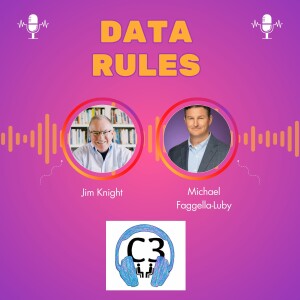
Thursday Dec 05, 2024
Data Rules: Jim Knight and Michael Faggella-Luby
Jim Knight is a founding senior partner of the Instructional Coaching Group (ICG) and a research associate at the University of Kansas Center for Research on Learning. He has spent more than two decades studying professional learning, effective teaching, and instructional coaching.
Knight has written several books and his articles on instructional coaching have been included in publications such as The Journal of Staff Development, Principal Leadership, The School Administrator, and Teachers Teaching Teachers.
He directs Pathways to Success, a comprehensive, district-wide school reform project in the Topeka, Kansas, School District and leads the Intensive Instructional Coaching Institutes and the Teaching Learning Coaching annual conference.
Michael Faggella-Luby, PhD, is a professor of special education and core faculty of the Alice Neeley Special Education Research and Service (ANSERS) Institute at Texas Christian University. He is also a past president of the Division for Learning Disabilities (DLD) of the Council for Exceptional Children and an associate editor for the Journal of Learning Disabilities. His primary research embeds cognitive learning strategies into subject-area courses to improve reading comprehension for all levels of learners. He has received two national awards for his research, has written 59 scholarly publications, and has presented 90 sessions at national or international conferences.
–Impact Cycle- Universal model for change- Identify- Learn - Improve - ten years of careful study.
-Identify stage- Where you are? Where do you want to get to? And how are you going to get there?
-Improvement - Try things out and figure out what does and does not work. Data makes the invisible visible. Data tells you if you are on track or off track, it is your GPS through the coaching cycle for their learning.
-Data is data, there is no good data or bad data. Data tells us about student learning. Is the data somehow tied to professional learning? Data that is collected and chosen by the teacher. It helps to create that collective dialogue.
-The objective data could be around engagement, teacher to student talk, levels of questioning, or so much more. More heads analyzing the data is better than one. Keep making adjustments and improvements. Collect and review data frequently. Think about engagement or achievement.
-The data helped her see every student. No child was left behind.
-Big data - standardized tests can tell us who is consistently benefiting over time. Big data has a big view. Small data is the sweet spot. Teachers identify the data they want to collect to have those micro influences on the small data which can lead to changes in the big data over time. Small data can make a big difference.
-Engagement: behavioral engagement, cognitive engagement, or emotional engagement. All data is imperfect. Match your assessment methodology to the kind and level of learning you are wanting to see.
-A.I. and the ability for it to remember such huge quantities of information. It is good for specific tasks. Audio files of their teaching. ChatGPT is constantly evolving. It will always give you an answer but it may or may not be what you are looking for. It has enormous potential but it does have limits. It will never replace the teacher or the coach.
-Coaching is helping others unleash their potential. Coaching is also about keeping kids first and doing what is best for kids. Having an unmistakable positive impact on the lives of kids.
-A coach is saying I am right there with you. Just asking some questions helps you to be the very best of what you can be.
Connect with Jim and Michael:
-https://www.instructionalcoaching.com/
-@Jimknight99
-@strategicdoc
-https://coe.tcu.edu/about/faculty-staff/view/michael-faggella-luby
-jim@instructionalcoaching.com
No comments yet. Be the first to say something!